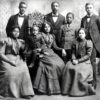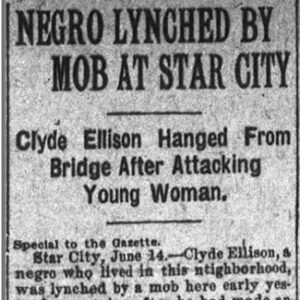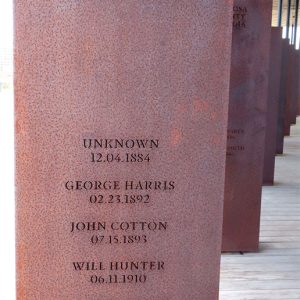calsfoundation@cals.org
Clyde Ellison (Lynching of)
On June 13, 1919, Clyde Ellison was lynched at Star City (Lincoln County) for allegedly assaulting the daughter of a local farmer.
Little is known about Clyde Ellison’s background. When he registered for the World War I draft on October 25, 1918, he was living in Florence (Drew County) and working for farmer Ernest Lytle. He was unable to give his date of birth and listed no close relatives. By June 1919, Ellison was living near Star City. According to an article in the Arkansas Gazette, it was alleged that he attempted to assault eighteen-year-old Iselle Bennett, who lived three miles from Star City. She was alone at the family home; her parents were out, and all of the hands were in the fields. When the alleged assault occurred, Bennett screamed, attracting the attention of the neighbors. Ellison ran away and hid in the woods, but a posse eventually found him, and he was identified by Bennett. A mob gathered, took Ellison to a bridge, put a rope around his neck, and forced him to jump off. According to the Gazette, “The mob dispersed and while the sheriff and deputies are investigating it is said that no member of the mob could be identified.”
As is sometimes the case, other accounts of these events were very different. According to Robert Thomas Kerlin, quoting the July 5 Colorado Statesman (Denver), Ellison was actually lynched because he refused to work in the cotton field of Iselle’s father David Bennett for eighty-five cents a day. In an effort to frighten him into working, Bennett invented the story of the assault and instructed his daughter to cooperate in the deception. The Statesman reported that Iselle Bennett actually confessed to this deception. In any case, Ellison was carried to the bridge, as stated above, and given one more chance to agree to work on Bennett’s terms. When he refused, he was stripped naked, and his body was burned with flat irons. His corpse was left hanging from the bridge, carrying a sign that stated, “This is how we treat lazy niggers.”
Although the town was small, and it was apparent who had committed the crime, no charges were ever brought. According to the Statesman, Bennett’s workers began to leave him after the lynching, as did workers on neighboring farms.
For additional information:
Kerlin, Robert Thomas. The Voice of the Negro 1919. New York: E. P. Dutton, 1920. Online at https://archive.org/details/voiceofnegro191900kerl (accessed September 23, 2021).
“Negro Lynched by Mob at Star City.” Arkansas Gazette, June 15, 1919, p. 6.
Nancy Snell Griffith
Clinton, South Carolina
 African Americans
African Americans Civil Rights and Social Change
Civil Rights and Social Change Early Twentieth Century, 1901 through 1940
Early Twentieth Century, 1901 through 1940 Ellison Lynching Article
Ellison Lynching Article  Lincoln County Lynching
Lincoln County Lynching 




Comments
No comments on this entry yet.